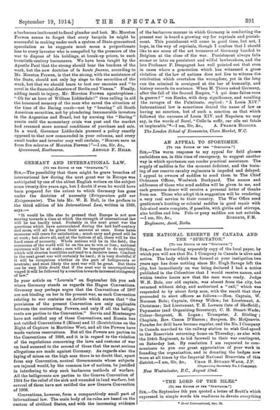GERMANY AND INTERNATIONAL LAW.
130 THIC EDITOR OW THE " SPACTATOR."1
Sin,—The possibility that there might be grave breaches of international law during the next great war in Europe was anticipated by one of the ablest English writers on the subject some twenty-five years ago, but I doubt if even he would have been prepared for the extent to which Germany has gone under the doctrine of necessity (Kriegsraison geht vor JCriegsmanier). The late Mr. W. E. Hall, in the preface to the third edition of his International Law, written in 1889, says :—
"It would be idle also to pretend that Europe is not now
moving towards a time at which the strength of international law will be too hardly tried. Probably in the next great war the questions which have accumulated during the last half-century and more, will all be given their answers at once. Some hates moreover will crave for satisfaction ; much envy and greed will be at work; but above all, and at the bottom of all, there will be the hard sense of necessity. Whole nations will be in the field; the commerce of the world will be on the sea to win or lose ; national existence will be at stake ; mon will be tempted to do anything which will shorten hostilities and tend to a decisive issue. Conduct in the next great war will certainly be hard; it is very doubtful if it will be scrupulous whether on the part of belligerents or neutrals; and most likely the next war will be great. But there can be very little doubt that if the next war is unscrupulously waged it will be followed by a reaction towards increased stringency of law."
In your article on "Louvain" on September 5th you ask where Germany stands as regards the Hague Conventions.
Germany may perhaps argue that the Conventions of 1907 are not binding on her in the present war, as each Convention
relating to war contains an Article which states that " the provisions of the present Convention are only applicable between the contracting Powers, and only if all the bellige- rents are parties to the Convention." Servia and Montenegro have not ratified any of these Conventions, and Russia has
not ratified Conventions 8 (Mines) and 11 (Restrictions on the Right of Capture in Maritime War), and all the Powers have made various reservations. But all the Powers are parties to the Conventions of 1899, and it is in regard to the violation
of the regulations concerning the laws and customs of war on land annexed to the second of these that the most serious allegations are made against Germany. As regards also the laying of mines on the high seas there is no doubt that, apart from any Convention, neutral Governments whose subjects are injured would, by the common law of nations, be justified in interfering to stop such barbarous methods of warfare. All the belligerents are parties to the Geneva Convention of 1864 for the relief of the sick and wounded in land warfare, but several of them have not ratified the new Geneva Convention
of 1906.
Conventions, however, form a comparatively small part of international law. The main body of its rules are based on the custom of civilized States, and with the increasing evidence
of the barbarous manner in which Germany is conducting the present war is heard a growing cry for reprisals and punish- ment. This punishment will come in good time, but not, I hope, in the way of reprisals, though I confess that I should like to see some of the art treasures of Germany handed to Belgium at the close of the war. Punishment always falls sooner or later on persistent and wilful lawbreakers, and the late Professor F. Despagnet has well pointed out that even in cases where a generation which has witnessed a gross violation of the law of nations does not live to witness the retribution which overtakes the wrongdoer, yet in the long run the criminal is arraigned at the bar of humanity, and history records its sentence. When M. Thiers asked Germany, after the fall of the Second Empire, "A qui done faites-vows la guerre ? " von Ranks, with deep significance, and recalling the ravages of the Palatinate, replied : " A Louis XIV." International law is sometimes denied the name of law as having no sanction, but of such a sanction as that which followed the excesses of Louis XIV. and Napoleon we may say, in the words of Sorel, " Celle-la suffit, car elle est fatale


































 Previous page
Previous page